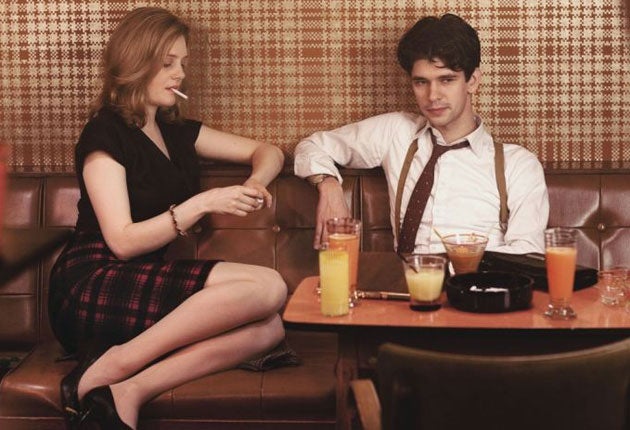Give The Hour more time to prove itself
Why do British TV series such as Abi Morgan's 1950s drama never allow characters any breathing space? By Ben Walsh

Your support helps us to tell the story
From reproductive rights to climate change to Big Tech, The Independent is on the ground when the story is developing. Whether it's investigating the financials of Elon Musk's pro-Trump PAC or producing our latest documentary, 'The A Word', which shines a light on the American women fighting for reproductive rights, we know how important it is to parse out the facts from the messaging.
At such a critical moment in US history, we need reporters on the ground. Your donation allows us to keep sending journalists to speak to both sides of the story.
The Independent is trusted by Americans across the entire political spectrum. And unlike many other quality news outlets, we choose not to lock Americans out of our reporting and analysis with paywalls. We believe quality journalism should be available to everyone, paid for by those who can afford it.
Your support makes all the difference.There has been a daft amount of grumbling and sniping about the six-part BBC2 series The Hour. Abi Morgan's 1950s drama, set in a bustling BBC television newsroom, was touted as Britain's answer to Mad Men but as its murder-mystery/conspiracy theory plot unfurled, that tired comparison seemed wide of the mark. There are similarities between The Hour and Mad Men – essentially the copious smoking, the period costume (although it's a tad drabber in London than in late-1950s New York) and the heavy drinking – but The Hour seemed to have much more in common with Paul Abbott's gripping political thriller, State of Play.
The Hour's giddy, sometimes heavy-handed hokum encompassed the Suez Crisis, shadowy government forces, a Tube station slaying, boozing, sex, a country-house shooting party and a host of terrific performances. The slight, pained-looking Ben Whishaw (fast morphing into a young Tom Courtenay) excelled as the quick-witted and self-righteous reporter Freddie; Dominic West was smarmy and slimy as the anchor and ladies man Hector; Julian Rhind-Tutt was ideal as a slithery spin doctor; and Anna Chancellor stole the show as Lix, a hardened, often blotto foreign correspondent. The Hour has been, by a country mile, the most enjoyable drama series on TV this year, welcome respite from Sarah Beeny or Kirstie Allsopp berating us for our lack taste or sense.
I have one reservation, however. In Mad Men, characters and plot-lines are permitted to breathe. In fact, in some episodes of Matthew Weiner's drama barely anything seems to happen. When something big does occur – the grisly lawnmower accident is a prime example – it is unsettling; shocking, even. But, of course, everything is happening (sexual politics, presidential assassinations, infidelity, racism, homophobia) in Mad Men. It just happens at a slower pace.
This was the major problem with The Hour, as with many recent British dramas and adaptations. Six episodes were not enough. The giant leap in the plot from episode five to six was baffling. Character development was missing. Why didn't the BBC give this compelling series 13 episodes? Is it really so unconvinced of audiences' attention span? One of the reasons critics wail about how good American (particularly HBO) dramas are is because such series are given time to work on their characters – see The Sopranos, Six Feet Under, Bored to Death, Weeds, The Wire, Breaking Bad and so on.
This was a major problem with Channel 4's recent adaptation of William Boyd's Any Human Heart, too. Boyd's sensational 503-page novel, which traces Logan Mountstuart's extraordinary, Zelig-like life from 1906 to 1991, was reduced to four measly episodes. It meant that key moments in the man's life were erased, most notably the first 50 or so pages of the book, in which Logan makes "a dare" with his two best schoolfriends which has a profound impact on their lives, informing their relationships and choices. Why was this cut? Presumably, because of budget concerns and the absurd presumption that TV audiences will not tolerate a lengthy series.
Patent rot. In 1981, Granada TV produced the epic Brideshead Revisited. Evelyn Waugh's 400-page book was furnished with a ravishing 11-part series. In 1984, Granada gave Paul Scott's grand Raj saga The Jewel in the Crown a 14-part series. Both were deliriously successful and are highly regarded today. Could Channel 4 not have given Boyd's masterpiece similar exposure?
It feels wasteful. Similarly, Steven Moffat's exquisite Sherlock, starring Benedict Cumberbatch, was permitted only three episodes last year. A new series is due in 2012. Why has this Bafta winner been given so little airtime?
The Hour has been granted a well-deserved second series. Let's hope the BBC has the courage for a longer run. The Hour clearly has the acting chops and the perky dialogue to pull it off, and it isn't as if such series come along every month.
Join our commenting forum
Join thought-provoking conversations, follow other Independent readers and see their replies
Comments